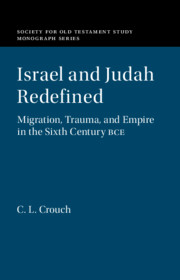Book contents
5 - Judah under Babylonian Rule
from Part III
Published online by Cambridge University Press: 05 August 2021
Summary
Those left behind in the land after 597 BCE were repudiated by the Israelite community in Babylonia. This chapter explores the consequences of the deportees’ absence, together with the imposition of Babylonian imperial power, on expressions of homeland identity. The remaining population was a mixed multitude, divided by social and economic class distinctions, by diverse geographical origins within the territory of a now-collapsed state, by a variety of ethnic and other affiliations, and by different experiences in the midst and in the aftermath of the Babylonian invasions. Nevertheless, these experiences fostered a strong sense of collective identity among these people, articulated with reference to their shared origins in the land called Judah. Though striking in its apparent suddenness, for the upheaval of this period to have produced a heightened awareness of Judahite identity is neither surprising nor peculiar. To the contrary, it is in keeping with responses to involuntary migration and to colonial-imperial domination which have been reported and observed in other times and places. Without pressing Judah to conform with more recent phenomena, this comparative material proves useful in illuminating observable features of these ancient texts.
- Type
- Chapter
- Information
- Israel and Judah RedefinedMigration, Trauma, and Empire in the Sixth Century BCE, pp. 115 - 146Publisher: Cambridge University PressPrint publication year: 2021

